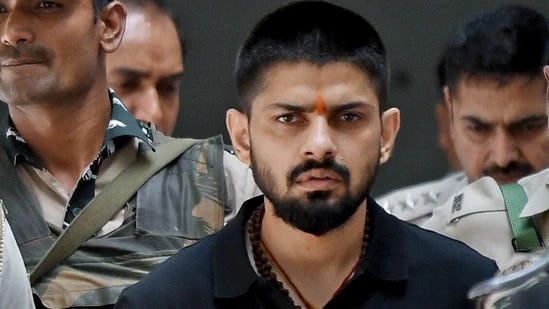Bishnoi Gang Terrorist Designation A Partial Victory Against Indian Transnational Repression
"Those Indian officials who have directed, financed, or facilitated this gang must also be exposed, sanctioned, and punished."
Jaskaran Sandhu
September 30, 2025 | 4 min. read | Original Reporting
On September 29, 2025, the Government of Canada announced it has officially listed the Bishnoi Gang as a terrorist entity.
According to the RCMP and Canadian security officials, the gang is used as a proxy by the Government of India to conduct transnational repression in Canada, including homicides, arsons, extortions and other criminal activity, targeting primarily the Sikh Canadian community.
The move gives authorities sweeping powers to freeze the group’s assets, restrict financial transactions, criminalize support or association, and expand surveillance efforts. Public Safety Minister Gary Anandasangaree added in a press release announcing the designation that Ottawa “will continue to use all tools at our disposal to protect Canadians from violence and intimidation.”
The announcement drew swift response from Sikh groups
The World Sikh Organization of Canada welcomed the listing but framed it as merely a partial victory. WSO contends that the Bishnoi Gang serves as an implement of India’s campaign of transnational repression against Sikhs in Canada, asserting that Indian state actors guided, financed, and enabled its violent tactics.
It points to high profile incidents such as the 2023 assassination of Canadian Sikh leader Hardeep Singh Nijjar and documented consular surveillance, arguing that the real architects of violence must also face consequences.
“Those Indian officials who have directed, financed, or facilitated this gang must also be exposed, sanctioned, and punished,” WSO President Danish Singh declared in their statement.
The Sikh Federation of Canada also expressed solidarity with steps taken to curtail gang activity, but it labeled the terrorist designation as insufficient in the face of India’s ongoing threats to the Sikh diaspora.
The Federation highlighted that Dinesh Patnaik’s recent appointment as India’s High Commissioner to Canada, coupled with a broader push by Ottawa to restore diplomatic normalcy with India, risks overshadowing accountability for violent acts.
It warned that unless Indian officials implicated in repression are held to account, Canada’s move will amount to a symbolic gesture with limited impact.
“The distinguishing feature here is the nexus between India’s government and organized crime, a nexus that Canadian authorities themselves have acknowledged but which was conspicuously absent from the public announcement,” Balpreet Singh, legal counsel for the WSO, shared with Baaz, echoing the Federation and other Sikh bodies.
According to reporting and statements from Canadian officials, the Bishnoi Gang is not simply a criminal outfit but is being directed by India’s Home Minister Amit Shah for political motivations and goals.
The RCMP has linked the gang directly to India, with officials confirming that it operates as an extension of state power.
For many, this makes the Bishnoi Gang fundamentally different from other gangs, because its violence is not random but part of an orchestrated campaign of transnational repression targeting Sikhs in Canada.
Sikhs for Justice described the designation as a “political distraction” designed to mask the Modi government’s direct involvement.
SFJ argued that assassinations and extortions attributed to Bishnoi were in fact directed by India’s government itself, funneled through its diplomats and consulates.
“Accountability for the assassination of Shaheed Hardeep Singh Nijjar cannot be outsourced to RAW’s proxy gang,” SFJ General Counsel Gurpatwant Singh Pannun said in their statement. He stressed that Bishnoi was an extension of Amit Shah’s criminal network and that Canada’s attempt to shift blame onto a gang amounted to an effort to renew relations with Modi’s regime rather than hold the masterminds accountable.
The listing also complicates Ottawa’s ongoing efforts to warm ties with New Delhi.
In recent months, the Canadian government has quietly signaled a desire to stabilize relations with India after years of strain following the assassination of Hardeep Singh Nijjar and allegations of Indian interference in Canada.
It does not appear at this juncture India has taken any meaningful public steps to acknowledge its role in transnational repression and foreign interference in Canada.
Balpreet Singh adds that “amidst the warming of ties between Canada and India we have seen continuing activity from the Bishnoi Gang and the Indian Government here, necessitating ongoing duty to warns for Sikh activists. The Carney administration needs to be cautious, because the steps it has been taking in this regard is sending mixed signals to Sikhs in Canada.”
Jaskaran Sandhu hails from Brampton, Canada, and is the co-founder of Baaz. He is a lawyer and previously served as Executive Director for the World Sikh Organization of Canada and as a Senior Advisor to Brampton’s Office of the Mayor. You can find Jaskaran on Twitter at @JaskaranSandhu_
Baaz is home to opinions, ideas, and original reporting for the Sikh and Punjabi diaspora. Support us by subscribing. Find us on Twitter, Instagram, Facebook, and TikTok at @BaazNewsOrg. If you would like to submit a written piece for consideration please email us at editor@baaznews.org.



Canada’s attempt to shift blame onto a gang is an effort to renew relations with Modi’s regime rather than hold the masterminds (Amit Shah and crew) accountable